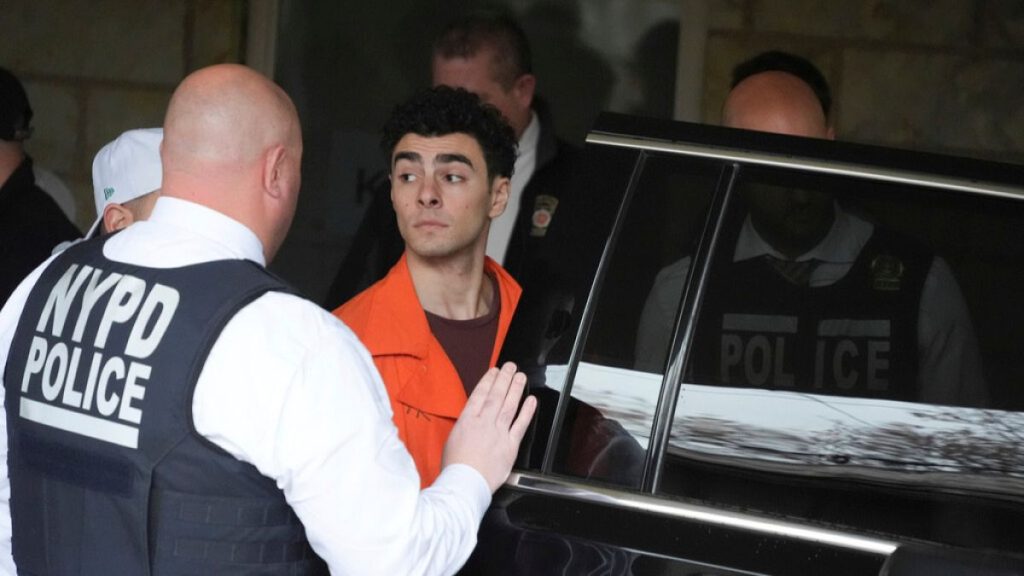Luigi Mangione, the suspect in the murder of UnitedHealthcare CEO Brian Thompson, has waived his right to an extradition hearing in Pennsylvania, paving the way for his return to New York to face a slew of charges, including first-degree murder and murder as an act of terrorism. Mangione’s arrest at a McDonald’s in Altoona, Pennsylvania, concluded a five-day manhunt following the killing in Manhattan. Authorities discovered a detailed plan and a handwritten manifesto in Mangione’s possession upon his arrest. The manifesto characterized health insurance companies as “parasitic,” condemned their corporate greed, and described the attack as “targeted” and “precise,” designed to avoid harming innocent individuals. Manhattan District Attorney Alvin Bragg labeled the murder a “frightening, well-planned, targeted” act intended to incite terror.
The prosecution’s decision to invoke a 9/11-era anti-terrorism law significantly elevates the potential consequences for Mangione. This law designates an offense as an act of terrorism if it aims to intimidate or coerce a civilian population, influence government policy through intimidation or coercion, or affect government conduct through murder, assassination, or kidnapping. By applying this statute, prosecutors can pursue a more severe sentencing category, potentially leading to a life sentence if Mangione is convicted. The use of this law underscores the gravity with which the authorities view this crime, placing it within the context of actions intended to generate widespread fear and disrupt societal norms.
Beyond the murder charges, Mangione also faces lesser charges in Pennsylvania, including gun and forgery offenses. He waived a preliminary hearing on these charges in exchange for receiving a comprehensive investigative report from the Altoona Police Department. The Blair County District Attorney, Pete Weeks, prioritized Mangione’s swift transfer to New York authorities, indicating a willingness to defer the Pennsylvania charges to allow the murder case to proceed. This expedited handover reflects the seriousness of the charges and the desire to ensure that Mangione is held accountable for his alleged actions in New York.
The killing of Brian Thompson ignited a national debate about the healthcare system in the United States. Social media platforms became forums for expressing resentment towards health insurance companies, with individuals sharing personal experiences of denied claims, exorbitant bills, and frustrating navigation through the healthcare system. The incident amplified existing anxieties and frustrations regarding access to and affordability of healthcare. Thompson’s murder became a catalyst for a broader discussion on the perceived failings of the healthcare industry and its impact on individuals.
The aftermath of the killing saw a reported increase in threats against corporate leaders in New York City, highlighting the volatile atmosphere created by the incident. “Wanted” posters featuring images of other executives appeared throughout Manhattan, indicating a potential escalation of tensions and a widening circle of fear. Law enforcement officials condemned any attempts to justify the murder, emphasizing the importance of upholding principles of justice and denouncing violence against corporate figures. Police Commissioner Jessica Tisch characterized attempts to rationalize the killing as “vile, reckless and offensive.”
The case against Luigi Mangione stands as a complex intersection of criminal justice, healthcare policy, and social unrest. The prosecution’s use of anti-terrorism laws highlights the perceived threat to societal stability posed by such targeted acts of violence against corporate leaders. The public outcry following Thompson’s death underscores the deep-seated frustrations surrounding the healthcare system, while the increased threats against other executives suggest a potential ripple effect of violence and fear. The trial of Luigi Mangione is likely to be a closely watched event, with implications extending far beyond the courtroom.














